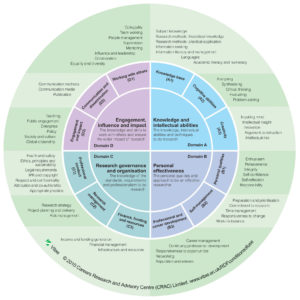Researcher Development Programme
The Researcher Development Programme is an open series of workshops designed to develop the knowledge, approaches and behaviours essential to the modern researcher. In an ever-changing sector, we expect our researchers to be agile and adaptable in the way they interact with communities both inside and outside the institution. To help them succeed, we strongly believe in listening to, and learning from, our research community to understand its needs and to shape our provision accordingly. In a recent institutional survey, we asked our PGRs and Supervisors which areas of development they saw as being most valuable for today’s researchers; they told us:
- Knowledge about the Research Milestones involved in doing a research degree
- Information on Research Methods and Approaches
- Academic Reading and Writing
- Approaches for Communication and Engagement
- All-round skills that focus on being an Effective Researcher.
The distinctiveness of the Researcher Development Programme is that it is:
- Co-created: our programme is designed and delivered by our staff, research leads, PGRs, Academic Librarians, Learning Development team, Research Support team, English Language Teaching team, and Innovation and Funding Support (Research Support). We value and recognise the expertise that we have at the university and, as such, we instinctively know who and where to turn to for expertise. We also realise that our PGRs bring a whole host of experience with them and we really value it when they offer to share this in a new workshop!
- Inclusive: all the workshops on our programme are delivered in a friendly, classroom environment. Our tutors often share materials before the workshop and sometimes even set work in advance, adopting an Active Blended Learning approach (ABL) that is standard good practice at UON. This encourages PGRs to use the workshops to put context and theory into practice. Many of the workshops are offered as online webinars or pre-recorded material that can be viewed on our virtual learning environment called NILE
The Researcher Development Programme (2022-2023)
Our Researcher Development Programme is mapped to a recognisable national framework. To do this, we use the Researcher Development Framework (RDF), created by Vitae. The RDF articulates the knowledge, behaviours and attributes of successful researchers and encourages them to realise their potential. Every one of our workshops is aligned to one or more of the twelve domains that can be seen in the illustration below:
Image long description: Circle which shows the different elements required for the Vitae Researcher Development Framework. This includes four domains, which each have three further sections: A: Knowledge and intellectual abilities (A1: Knowledge base A2: Cognitive abilities. A3: Creativity). B: Personal Effectiveness (B1: Personal qualities B2: Self-management B3: Professional and career development). C: Research governance and organisation (C1: Professional conduct C2: Research management C3: Professional conduct). D: Engagement, influence and impact (D1: Working with others D2: Communication and dissemination D3: Engagement and impact). For more information about the framework, please visit The Vitae Researcher Development Framework website.
Researcher Development Days
Doctoral study can be isolating and meeting up with others in person is a great way to relieve concerns, chat about research, share tips and tricks for progressing and increasing motivation. Our monthly Development Days for PGRs comprise a full day, usually on campus, on a theme and feature practical workshops with lunch and the opportunity to meet with fellow PGRs from across the university. They include ‘stage’ workshops (Starting, Middle and Finishing), presentation skills, critical thinking, quantitative and qualitative research methods and writing retreats.
Events that Promote Researcher Development
Annual Research Conference
Each year in June we celebrate the very finest research that Northampton has to offer in our annual two-day Research Conference. Last year’s Conference saw an online day and an on-campus day and an exciting array of activities including two distinguished speakers, roundtables, presentations and Pecha Kucha. We invite all researchers, at whatever stage in their research, to join us for this joyous and collaborative event. The feedback from our postgraduate researchers has been positive, some said about previous conferences “Wonderful collegiate feeling to it all”, and “The essence of research community and enthusiasm was infectious.”
Research Competition
Our Images of Research competition invites researchers to present an original image that connects, comments on, or represents their research. They are asked to be as creative as they can to capture the viewer’s imagination. Alongside the image, they’re asked to produce a snappy title and a small piece of text describing their image in plain English and no jargon! All entries are judged by a local, business entrepreneur in the Professional Judge’s Vote and put to the test in front of the research community in a People’s Vote.
Research Poster Competition
Each year, our postgraduate researchers are challenged with the task of reconfiguring their research in a way that would appeal to a non-specialist audience in our Research Poster Competition. Whether PGRs have just started their research degree or in the closing stages, everyone is welcome to submit a poster entry. Supportive development sessions are also offered in the build up to the competition to increase levels of confidence.
